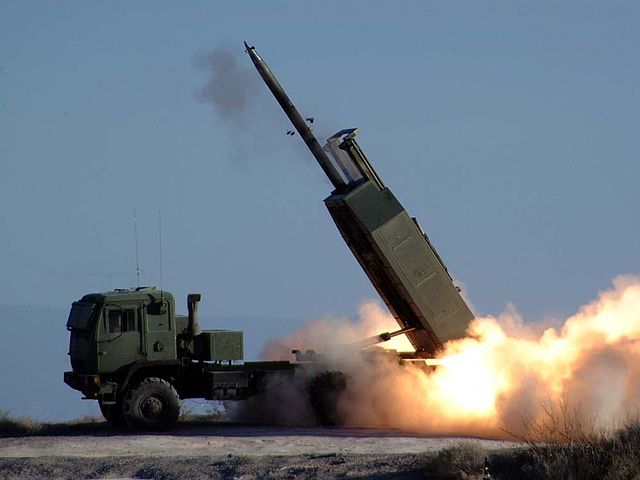The Plot To Partition Syria
June 2017
View full size OCHA [CC BY 3.0], via Wikimedia Commons |
View full size By U.S. Army photo [Public domain], via Wikimedia Commons
The High Mobility Artillery Rocket System fires the Army's new guided Multiple Launch Rocket System during testing at White Sands Missile Range, 2005. |
June 20, 2017 (EIRNS)—There are plans coming from certain elements within the U.S. intelligence and military community to de facto partition Syria. These are the same circles who are out to sabotage President Trump’s stated intention not to be involved in any more regime change wars in general, nor in the internal affairs of Syria in particular.
Former DIA officer Col. (ret.) Pat Lang, in a June 19 blog posting, reports that US coalition activity is so aggressive in the Raqqa/Tabqa area of north Syria and in the southeast around the Al Tanf border crossing (near where the Syrian border meets Iraq and Jordan),
"that it seems clear that the US intends to partition Syria on a de facto basis, with the east being used as a base for a post-IS campaign against the Syrian government."
The establishment of a U.S. military base in Al Tanf, without any approval of the Syrian government, drew fire from Virginia State Senator Richard Black, who told a Sputnik interviewer:
"You can’t get a more obvious violation of international law than to actually move in and set up a military base in a sovereign country that has never taken any offensive action towards our country."
In Russia, the recent U.S. deployment of two HIMARS (High Mobility Artillery Rocket System) rocket launchers to Al Tanf is seen by some qualified observers as a sign of those U.S. partition plans. Raqqa is just beyond the HIMARS reach from Al Tanf; therefore, the main goal of the United States is enforcing a unilaterally declared "de-confliction zone" in the area to prevent Iran from sending supplies to the Syrian army, reports Russia Beyond the Headlines.
"Deploying HIMARS, the U.S. sends a clear signal to Moscow and Damascus that it won’t give Syrian-Iraqi-Jordanian border under the control of pro-Syrian government and Iranian forces,"
Alexey Klebnikov, Middle East expert at Russian International Affairs Council, stated.
Remarks made earlier this week at the National Press Club in Washington, D.C., by Chairman of the Joint Chiefs of Staff Gen. Joseph Dunford, also left the door open for those campaigning for partition. As the U.S.-led coalition supports local efforts to seize Raqqa, Dunford said, another effort led by the U.S. State Department is establishing a governance body that will take over once Raqqa is seized.
"That governance will leverage Arab leaders who are from Raqqa and will also work on establishing a security force made up of local personnel so stabilization efforts that will follow the seizure of Raqqa,"
Dunford added.
